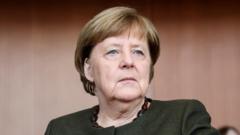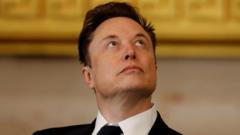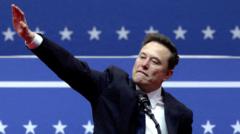The rise of alternative political powers fueled by Musk's controversial support highlights a crisis in legacy parties across Europe.
Musk's Disruption: The New Face of European Politics

Musk's Disruption: The New Face of European Politics
Elon Musk backs far-right parties, shaking up traditional European political landscapes.
Elon Musk, the world's richest individual, is leveraging his disruptive approach to shake up European politics, reminiscent of his successes with companies like PayPal, Tesla, and SpaceX. By mobilizing his social media platform X, Musk is financially backing far-right parties such as Germany's Alternative for Germany (AfD) and the UK’s Reform Party, both of which pose significant threats to established political norms.
During a recent AfD rally in Halle, Musk ignited controversy with statements questioning Germany's focus on historical guilt, coinciding with the anniversary of the liberation of Auschwitz. His actions hint at a deeper concern the political establishment has regarding the growing trust deficits of traditional parties, which have historically commanded massive voter bases.
The AfD, now Germany's second most-popular party, exemplifies the shifting political landscape—once a dominant Social Democratic Party struggles at a historic low with only 16% projected voter support ahead of the upcoming elections. Meanwhile, the Christian Democrats face a potential victory with less than a third of the votes. In the UK, Labour's resurgence last summer is already threatened by dwindling poll numbers at just 20%.
Voter dissatisfaction stems from stagnant economic growth, eroded public services, rising immigration rates, and a pervading belief that future generations will face worse conditions. Citizens feel neglected by traditional political factions, leading to a rising inclination toward alternative parties promising change. Elon Musk's interventions may just be the catalyst needed to propel these new movements into the forefront of European politics.
During a recent AfD rally in Halle, Musk ignited controversy with statements questioning Germany's focus on historical guilt, coinciding with the anniversary of the liberation of Auschwitz. His actions hint at a deeper concern the political establishment has regarding the growing trust deficits of traditional parties, which have historically commanded massive voter bases.
The AfD, now Germany's second most-popular party, exemplifies the shifting political landscape—once a dominant Social Democratic Party struggles at a historic low with only 16% projected voter support ahead of the upcoming elections. Meanwhile, the Christian Democrats face a potential victory with less than a third of the votes. In the UK, Labour's resurgence last summer is already threatened by dwindling poll numbers at just 20%.
Voter dissatisfaction stems from stagnant economic growth, eroded public services, rising immigration rates, and a pervading belief that future generations will face worse conditions. Citizens feel neglected by traditional political factions, leading to a rising inclination toward alternative parties promising change. Elon Musk's interventions may just be the catalyst needed to propel these new movements into the forefront of European politics.






















